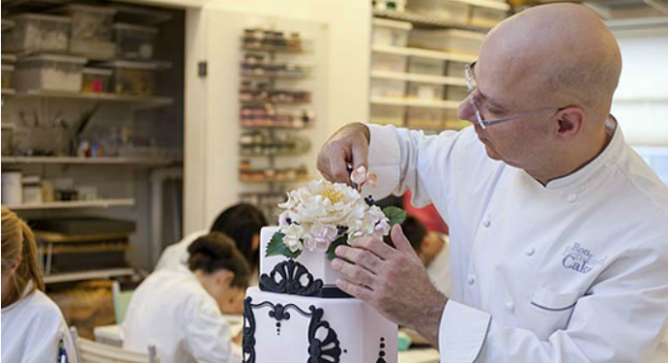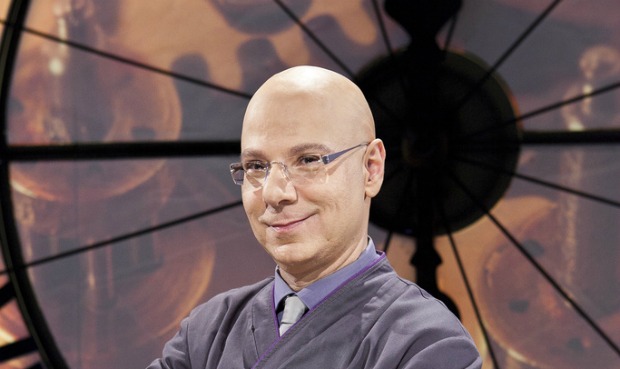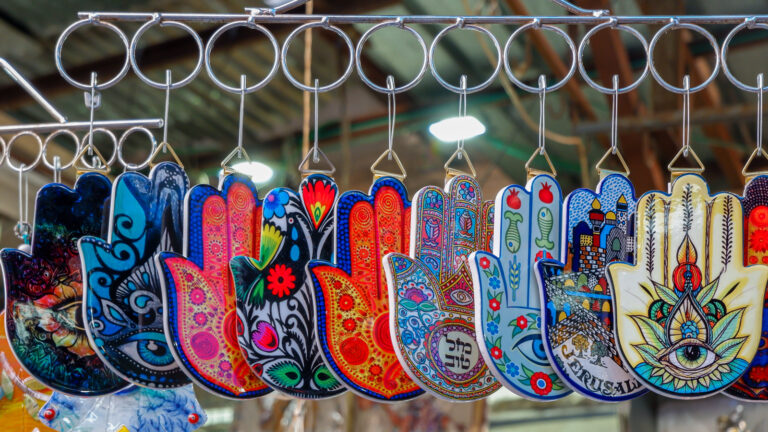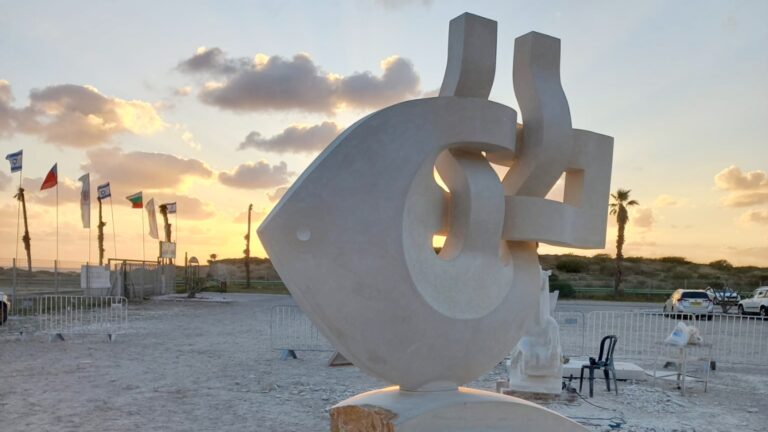Looking austere in a gray chef’s coat, world-renowned cake stylist and Sweet Genius emcee Ron Ben-Israel can crumble confident pastry chefs by declaring their confections “a disaster.”
On this popular Food Network show, now beginning its third US season, four contestants compete for $10,000 by whipping up what Tel Aviv native Ben-Israel deems the best “genius” dessert incorporating odd ingredients such as pink beans, hot sauce, black radishes, Tofurky, lemongrass, dried mushrooms or even the Passover flatbread matzoh.
Spread the Word
• Email this article to friends or colleagues
• Share this article on Facebook or Twitter
• Write about and link to this article on your blog
• Local relevancy? Send this article to your local press
Yet despite his rock-candy exterior on the show, the 55-year-old baker reveals his friendly, easygoing inner self in an interview with ISRAEL21c. After all, Israelis are often called “sabras” because, like the sabra cactus fruit, they are known to be prickly on the outside and softly sweet on the inside.
“The show changed my life,” says Ben-Israel, who was discovered by domestic doyenne Martha Stewart in 1996 and opened the award-winning Ron Ben-Israel Cakes in Manhattan’s SoHo neighborhood in 1999. “It’s a big bracha [blessing] for me,” he adds.
Eating with the eyes
“I never thought of myself as the ‘sweet genius,’” insists the man dubbed “the Manolo Blahnik of cakes” by The New York Times.
“I was interested in the concept of inspiration. I wanted to show people that a pastry chef has to make delicious food that first we ‘eat’ with our eyes. It’s hard to do a main course inspired by Buckingham Palace, but in a cake form it will be ideal.”
The exquisite (and exquisitely expensive) Ron Ben-Israel cakes produced for fancy weddings and parties are seen only by guests at these galas. But his 12-foot-high, eight-foot-wide cake fashioned with the aid of 17 pastry chefs for the glitzy 2007 centennial of New York’s Israeli-owned Plaza Hotel was a public showstopper.
“I would love to do something on this scale again,” he says.
The creations take weeks to perfect, with help from eight fulltime artisans and chefs, plus interns he chooses from pastry departments of culinary schools in New York.
Ben-Israel has no such formal training – at least not in cake design. He was a professional dancer for 15 years before swapping ballet slippers for spatulas.
Dancer to cake decorator
A graduate of the Thelma Yellin High School for the Arts in Tel Aviv, Ben-Israel joined Israeli dance troupe Bat Dor after serving in the military.
“I have been in New York over 20 years,” he relates. “I first came with Bat Dor to perform, and then worked in Canada as a dancer. I started making pies in Canadian bakeries as a side job, which I had never done in my life.”
At 36, he retired from dance to make a living from his new love, backed up by a rich family tradition in the kitchen.
“One of my earliest inspirations was watching my mother making schnitzel,” he says, referring to the breaded, fried chicken cutlets ubiquitous to Israeli cuisine. “She is from Vienna and she is a cartographer. In those days, cartographers drew maps from aerial photos, requiring great accuracy. With schnitzel-making, she would line up three exact-size bowls for eggs, flour and breadcrumbs. Her process was so methodical and culminated in a delicious schnitzel.”
Copying her accuracy has proven important to Ben-Israel’s success. “In pastry, a certain order gives you a successful product.”
And so does a dancer’s training. “I notice that people who were dancers or athletes are much better in the kitchen, because they know how to move; they have great spatial relationships. And dancers have to rehearse every day until it becomes perfect. This type of discipline helped me become a good baker, because bakers need to be very accurate and need to practice.”
There is a critical difference, however. “With dance, every day you have to start almost from scratch since the body is your instrument and it changes all the time. With baking, day after day the results from the same recipes and techniques are always good.”
Inspiration and magic
Ben-Israel will soon arrive for his yearly vacation in Israel. He hopes to visit schools such as the Tel Aviv-area Bishulim (Israeli Institute of Culinary Arts) and Estella. Mostly he’ll be enjoying the beach and the cafés, restaurants and street food of his hometown.
“And of course I visit my family. My sister is a great cook, so we do Shabbat dinner together there. And I try to see dance and theater and meet a lot of people.”
He is still anonymous in Israel, unlike in the United States.
“Week after week, people recognize me on the street. Whole families surround me in the airport,” he says. “The kids, especially, understand that my show is about inspiration and magic. I’m dying to do a show for kids where they could compete together with or against their parents.” He’d also like to do an Israeli version.
What is in store this season? “I took more chances in the upcoming season, so if you expect it to be all pink and rosy, well, it won’t be — but it will be a lot of fun,” promises the sweet genius.

















